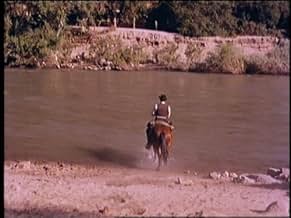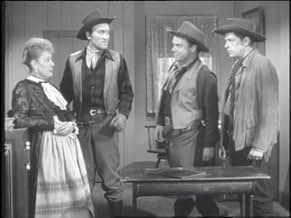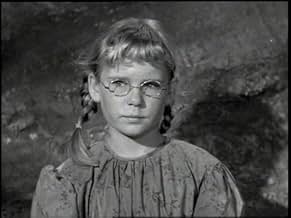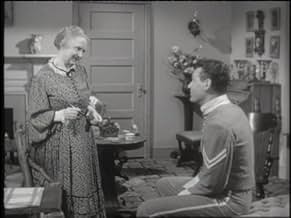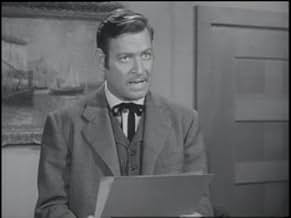As aventuras do herói mascarado e seu companheiro indígena americano.As aventuras do herói mascarado e seu companheiro indígena americano.As aventuras do herói mascarado e seu companheiro indígena americano.
- Indicado para 2 Primetime Emmys
- 3 indicações no total
Explorar episódios
Enredo
Você sabia?
- CuriosidadesThe Lone Ranger's young nephew, Dan Reid, who appeared occasionally on this show, was the father of Britt Reid, The Green Hornet. Both characters were created for radio by George W. Trendle.
- Erros de gravaçãoIn the series opening used in syndication, the Lone Ranger is seen riding past rows of trees planted as wind breaks. This practice did not come into use until after the "dust bowl" windstorms of the 1930s.
- Citações
[first lines for each episode]
Narrator: The Lone Ranger!
[gunshots are fired]
The Lone Ranger: Hi-yo, Silver!
Narrator: A fiery horse with the speed of light, a cloud of dust and a hearty "Hi-yo Silver" - the Lone Ranger!
The Lone Ranger: Hi-yo, Silver, away!
Narrator: With his faithful Indian companion, Tonto, the daring and resourceful masked rider of the plains led the fight for law and order in the early West. Return with us now to those thrilling days of yesteryear. The Lone Ranger rides again!
- Versões alternativasThe first three episodes are available edited together as a ersatz feature "Enter the Lone Ranger" (1949) running 68 minutes minus titles and recaps.
- ConexõesEdited into The Legend of the Lone Ranger (1952)
- Trilhas sonorasWilliam Tell Overture: Finale
by Gioachino Rossini
Avaliação em destaque
Looking back on `The Lone Ranger' TV series as an adult is a strange experience. Watching episodes through an adult's eyes alerted me to flaws I didn't notice when I was a kid: the acting was sometimes on the B-movie level. The stories tended to be repetitive and simplistic. The Native Americans were generally played by Caucasian or Hispanic or Italian-American actors. The `outdoor' exteriors in a lot of episodes were obviously indoor sets. But there is a spirit and an energy to the show that you can't deny.
Most of the credit for the show's success goes to its leads, Clayton Moore and Jay Silverheels. They became the Lone Ranger and Tonto, lived the roles as no other actors before or since. Moore, in particular, knew the Ranger was presented as a hero and an example to children, and from what I've heard, he tried his best to live up to that. He made the Ranger a fair and just man, someone who didn't judge, who gave people the benefit of the doubt, but acted correctly when the time was right. He used violence only as a last resort. He was a symbol of honor and integrity, the kind of person I wish I could be.
As for Tonto... It occurs to me nowadays how great an actor Jay Silverheels was. Critics of the show always want to use Tonto as the stereotypical ignorant savage, but you have to look at all the things Tonto does. Tonto tracks, takes care of the Ranger when he's wounded, spies out information - you can tell from the expressions on Silverheels' face that there's a lot more going on inside Tonto's head than he lets on. Don't let the broken English fool you!
The thing that really impresses me about `The Lone Ranger' now is how much of a partnership these two characters have. Tonto is not the Ranger's subordinate - they are friends, equals in their adventures. That, as much as any lesson taught in any episode, is what draws me back to the series after so many years: a tried and true friendship.
Oh, if only the Lone Ranger could ride again.
Most of the credit for the show's success goes to its leads, Clayton Moore and Jay Silverheels. They became the Lone Ranger and Tonto, lived the roles as no other actors before or since. Moore, in particular, knew the Ranger was presented as a hero and an example to children, and from what I've heard, he tried his best to live up to that. He made the Ranger a fair and just man, someone who didn't judge, who gave people the benefit of the doubt, but acted correctly when the time was right. He used violence only as a last resort. He was a symbol of honor and integrity, the kind of person I wish I could be.
As for Tonto... It occurs to me nowadays how great an actor Jay Silverheels was. Critics of the show always want to use Tonto as the stereotypical ignorant savage, but you have to look at all the things Tonto does. Tonto tracks, takes care of the Ranger when he's wounded, spies out information - you can tell from the expressions on Silverheels' face that there's a lot more going on inside Tonto's head than he lets on. Don't let the broken English fool you!
The thing that really impresses me about `The Lone Ranger' now is how much of a partnership these two characters have. Tonto is not the Ranger's subordinate - they are friends, equals in their adventures. That, as much as any lesson taught in any episode, is what draws me back to the series after so many years: a tried and true friendship.
Oh, if only the Lone Ranger could ride again.
- Shield-3
- 27 de jan. de 2002
- Link permanente
Principais escolhas
Faça login para avaliar e ver a lista de recomendações personalizadas
- How many seasons does The Lone Ranger have?Fornecido pela Alexa
Detalhes
- Data de lançamento
- País de origem
- Idioma
- Também conhecido como
- As Aventuras do Zorro, o Cavaleiro Solitário
- Locações de filme
- Empresas de produção
- Consulte mais créditos da empresa na IMDbPro
- Tempo de duração30 minutos
- Proporção
- 1.33 : 1
Contribua para esta página
Sugerir uma alteração ou adicionar conteúdo ausente




